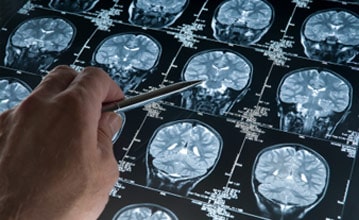Treatment for ALS in Leesburg, VA
What is ALS?
Commonly known as Lou Gehrig’s Disease or ALS, Amyotrophic Lateral Sclerosis is a disease of the nervous system that affects the brain’s nerve cells and the spinal cord, typically resulting in a loss of muscle control.
This disease can be especially difficult to treat because it is progressive and doctors do not know why ALS occurs in some people.
Dr. Seth Tuwiner provides comprehensive testing and treatment for ALS at his office in Leesburg, VA. Learn more about your treatment options and call the Virginia Center for Neuroscience today at (703) 293-5244.
Symptoms of ALS
ALS can be difficult to detect because the signs and symptoms of it vary person to person. This is dependent on which neurons were affected. A few of the signs and symptoms of ALS may include:
- Trouble swallowing
- Slurred speech
- Hand weakness or clumsiness
- Cognitive and behavioral changes
- Difficulty walking
- Weakness in legs, ankles, and feet
Symptoms of ALS usually start in your hands, feet, or limbs, then spread throughout the entire body. This happens as the disease becomes more severe and the nerve cells are wiped out, the muscles begin to weaken. This can affect the ability to speak, chew, swallow or even breath.
Causes and Risk Factors of ALS
ALS is caused by damage to the nerve cells that control certain muscle movements such as talking and chewing. These movements are controlled by motor neurons.
As the disease progresses, these motor neurons can no longer work properly. Due to this, the neurons can’t send messages to the muscles to function.
Doctors know that ALS is inherited in 5% to 10% of people affected by ALS. For others, the cause is unknown. The following risk factors for ALS include:
Sex- Men younger than 65 years old are more likely to get ALS than women in that same age group.
Age- As someone ages, their chances of getting the disease increase, especially if they are between 40 and 65 years of age.
Genetics- ALS has been found to pass down in families and has even shown that in those families, children have a 50-50 chance of developing the disease in their life.
Treatment Options for ALS
Although there is no cure for ALS, there are treatments that can help to slow down its progression. This may require a team of doctors at The Virginia Center for Neuroscience to provide personalized care for your condition which has been seen to improve the chances of survival and overall quality of life. Treatments may include:
- Medication
- Physical Therapy
- Occupational Therapy
- Speech Therapy
- Nutrition Therapy
Complications of ALS
Complications that can arise if the disease if left untreated include:
Breathing-ALS disease paralyzes the muscles used to breathe. Respiratory failure is the number one cause of death for ALS patients. Your doctor may prescribe a device to help you breathe at night.
Speaking-Many people with ALS develop speech issues and eventually need a device to help them speak.
Eating-ALS affects your ability to swallow so it is not uncommon for people with ALS to deal with malnutrition and dehydration. Some patients need a feeding tube to help them get their nutrients.
Cognition & Memory - ALS has also been known to cause issues with decision making and memory.
ALS Evaluation and Treatment in Northern Virginia
If you are suffering from ALS and are seeking treatment options, schedule a consultation with Seth Tuwiner, MD today by calling (703) 293-5244.




